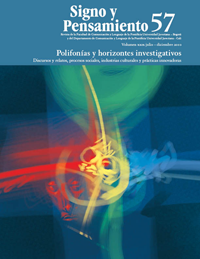Resumo
Las convocatorias y la respuesta a las marchas del 4 de febrero y el 6 de marzo de 2008 se han constituido como uno de los mayores impactos en términos de movilización ciudadana en Colombia. Los medios masivos de comunicación fueron actores decisivos para la divulgación de las marchas, y de persuasión para que los ciudadanos se sumaran o no a éstas. El equipo de investigación del proyecto Representaciones de las movilizaciones sociales por la paz en la prensa colombiana: 4 de febrero y 6 de marzo de 2008 recopiló las noticias sobre las marchas publicadas en tres diarios impresos de circulación nacional: el diario El Tiempo (el mayor periódico nacional), el diario El Colombiano (que representa la región del país con el índice más alto de movilizaciones sociales) y el semanario Voz (que representa los sectores políticos de izquierda y pertenece al partido comunista).
Dijk, T. V. (2000), El discurso como estructura y proceso, Barcelona, Gedisa.
— (2000), El discurso como interacción social, Barcelona, Gedisa.
— (2001), Ideología. Una aproximación multidisciplinaría, Barcelona, Gedisa.
Herrera, M. C. y Ramírez, L. M. (2008), “Políticas de la memoria como forma de socialización y de subjetivación política: un análisis histórico sobre el tiempo presente”, en XIV Congreso Colombiano de Historia, Tunja, Colombia.
Jäger, S. (2001), “Discurso y conocimiento: aspectos teóricos y metodológicos de la crítica del discurso y del análisis de dispositivos”, en Wodak, R. y Meyer, M., Métodos de análisis crítico del discurso, Barcelona, Gedisa, pp. 61-100.
Moscovici, S. y Marková, I. (2003), “La presentación de las representaciones sociales: diálogo con Serge Moscovici”, en Castorina, J. (comp.), Representaciones sociales. Problemas teóricos y conocimientos infantiles, Barcelona, Gedisa, pp. 111-152.
Pardo, N. (2007), Cómo hacer análisis crítico del discurso. Una perspectiva latinoamericana, Santiago de Chile, Frasis.
Sunkel, G. (1984), Representación del pueblo en los diarios populares de masas, Santiago de Chile, Ilet.
Vasilachis, I. (1998), La construcción de representaciones sociales. Discurso político y prensa escrita. Un análisis sociológico, jurídico y lingüístico, Barcelona, Gedisa.
Wodak, R. (ed.) (1989), Language, Power and Ideology. Studies in Political Discourse, Ámsterdam, Benjamins.
Esta revista científica se encuentra registrada bajo la licencia Creative Commons Reconocimiento 4.0 Internacional. Por lo tanto, esta obra se puede reproducir, distribuir y comunicar públicamente en formato digital, siempre que se reconozca el nombre de los autores y a la Pontificia Universidad Javeriana. Se permite citar, adaptar, transformar, autoarchivar, republicar y crear a partir del material, para cualquier finalidad (incluso comercial), siempre que se reconozca adecuadamente la autoría, se proporcione un enlace a la obra original y se indique si se han realizado cambios. La Pontificia Universidad Javeriana no retiene los derechos sobre las obras publicadas y los contenidos son responsabilidad exclusiva de los autores, quienes conservan sus derechos morales, intelectuales, de privacidad y publicidad.
El aval sobre la intervención de la obra (revisión, corrección de estilo, traducción, diagramación) y su posterior divulgación se otorga mediante una licencia de uso y no a través de una cesión de derechos, lo que representa que la revista y la Pontificia Universidad Javeriana se eximen de cualquier responsabilidad que se pueda derivar de una mala práctica ética por parte de los autores. En consecuencia de la protección brindada por la licencia de uso, la revista no se encuentra en la obligación de publicar retractaciones o modificar la información ya publicada, a no ser que la errata surja del proceso de gestión editorial. La publicación de contenidos en esta revista no representa regalías para los contribuyentes.


